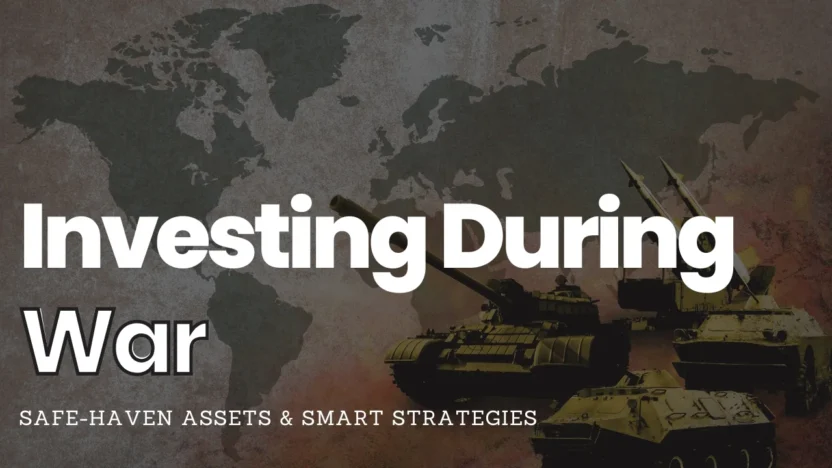Imagine waking up one morning to breaking news that two countries have declared war — for example, Israel and Iran. Within minutes, financial markets across the globe tumble, oil prices jump higher, and everyone you know is texting, asking, “What does this mean for our money?”
Times of geopolitical conflict create fear and uncertainty in our everyday lives. But they also ripple into global markets and your personal investments. Investors often face a difficult question in these moments: Should we change course or hold steady? What are the risks, and where can we find shelter for our savings? Let’s take a deep dive into how wars affect investments, what to do — and what to avoid — when the world seems to be spinning.
🌍 A Shock to the System: How Wars Shake the Markets
When countries go to war — especially two countries like Israel and Iran with strategic importance — the entire world pays attention. Why? Because modern economies are intertwined.
Think back to the Gulf War in 1990–1991. Oil prices surged over 100% in just a few months as investors feared supply disruptions. Markets fell quickly too — the S&P 500 dropped around 16% in a matter of weeks. But that wasn’t the end of the story: once the war ended, stocks bounced back faster than most predicted.
More recently, during the Russia-Ukraine war in 2022, energy prices spiked, Europe faced an energy crisis, and supply chains were strained. Yet after the first shock, investors who stayed invested — especially in energy and defense sectors — saw substantial gains.
🏅 Safe Havens: Where Investors Seek Shelter
When tensions rise and uncertainty spreads, investors often turn to assets considered stable or safe-haven investments. Throughout history, some of these options have retained or even increased their value during war:
- Gold (Physical Gold, Gold ETFs like Nippon India Gold ETF) — Indians have a cultural affinity for gold. Gold ETFs and Sovereign Gold Bonds (SGBs) are safe, tradable options that often rise when global fears grow.
- Government Bonds and Fixed Deposits (e.g. SBI FDs) — Bank fixed deposits and Government of India bonds offer stability and a fixed return. You can also look into Bharat Bond ETFs for easy government bond exposure.
- USD-denominated assets or Funds with US Exposure — Indian mutual funds like ICICI Prudential US Bluechip or Motilal Oswal Nasdaq 100 give exposure to the U.S. market, which is often more stable.
📉 What Gets Hit Hardest: Sectors to Avoid
While some investments rise during war, others take a big hit — often abruptly:
- Airlines (e.g. InterGlobe Aviation – IndiGo) — Travel restrictions and fuel price hikes hit airline profits immediately.
- Oil-Dependent Companies (e.g. Paints & Chemicals) — Companies like Asian Paints or Berger Paints may struggle with higher crude and raw material costs.
- Travel & Tourism Companies (e.g. Thomas Cook India) — War dampens travel plans and business sentiment.
🪖 Defense and Energy: Unexpected Winners
While most of the economy may feel pain during a war, some industries do very well.
- Defense stocks (e.g. Hindustan Aeronautics Ltd. (HAL), Bharat Electronics Ltd. (BEL), Bharat Dynamics) — The Indian government boosts spending on defense equipment and indigenous production under the ‘Make in India’ initiative.
- Oil & Gas companies (e.g. Oil and Natural Gas Corporation (ONGC), Reliance Industries) — Energy producers and refiners often profit as crude prices jump.
- Cybersecurity (e.g. Quick Heal) — Cybersecurity is becoming a priority as cyber-warfare grows. Companies protecting data and networks could benefit.

🏡 Real Assets: Land, Commodities, and Precious Metals
Sometimes, the most straightforward investments hold up best. Real assets like land, agricultural commodities, and metals tend to appreciate or hold their value in uncertain times. Land especially — whether it’s farmland, commercial property, or timberland — is a tangible asset that doesn’t evaporate just because stock prices are swinging.
Gold, silver, and industrial metals like copper and aluminum also gain attention. Investors often buy shares of mining companies or directly purchase bullion as a buffer against both war and inflation.
🧠 Keeping Calm: The Power of Liquidity and Diversification
When news of war hits, it’s tempting to react emotionally. But history proves that knee-jerk reactions rarely serve investors well. Instead, experienced investors advocate for these principles:
Keep some cash ready:
When prices drop, opportunities emerge. Having cash in savings accounts or short-term bonds lets you buy into companies and assets at discounted rates.
Diversify across geographies and industries:
No one can predict exactly how a conflict will ripple across the world. That’s why spreading your money across sectors — from tech to healthcare — and countries — from the U.S. to Japan — protects you if one region is hit harder than another.
Avoid panic selling:
Remember the 2008 Financial Crisis or the COVID-19 crash of 2020? Investors who sold everything at the bottom often missed the quick recoveries. Keeping a long-term view and sticking to your plan pays off more often than reacting impulsively.
🧭 Stay Informed — But Don’t Overreact
In a connected world, headlines travel faster than ever. It’s crucial to stay updated through credible sources — financial news outlets like Bloomberg, Reuters, or your personal financial advisor — so you can make informed decisions. At the same time, don’t over-consume the noise. Endless tweets and opinion pieces can drive fear and cause rash moves. Instead, focus on facts like company earnings, long-term trends, and global economic indicators.
📜 What History Teaches Us
History is one of the best teachers in uncertain times. Consider this:
- After the Cuban Missile Crisis in 1962, the U.S. stock market fell nearly 7%, then rallied over the next year.
- Following the September 11 attacks in 2001, U.S. markets dropped sharply for a week — then rebounded and went on to gain nearly 20% in the following year.
- Even after the Russia-Ukraine conflct in 2022, energy companies boomed and diversified global supply chains helped markets adapt.
- After the Kargil War (1999), Indian markets corrected briefly but rebounded within months.
- Even during the COVID-19 crash (2020), Indian indices fell nearly 40% before roaring back to all-time highs.
In short, wars cause pain and fear — but they don’t last forever. Eventually, agreements are struck, rebuilding begins, and economies adjust. Investors who stayed disciplined and thought long-term often came out stronger.
🎯 Final Thoughts: Invest Wisely, Stay Calm
War is tragic, painful, and unpredictable. And for investors, it can feel like navigating a storm without a compass. But by focusing on safe-haven assets like gold, bonds, and stable currencies — and avoiding high-risk bets like airline or discretionary stocks — you can protect your portfolio.
And if you have the patience and liquidity to wait, wars often create unique buying opportunities too. Think of the oil companies, defense giants, and even real-estate owners who weathered past conflicts and thrived afterwards. Keep a balanced portfolio, stay informed, and remember that even the most uncertain times eventually pass.
Long-term investing is a marathon. Stick to the fundamentals, diversify, and hold your nerve — history has shown that discipline pays off.
For more articles like this, visit think2invest.in 🔥





